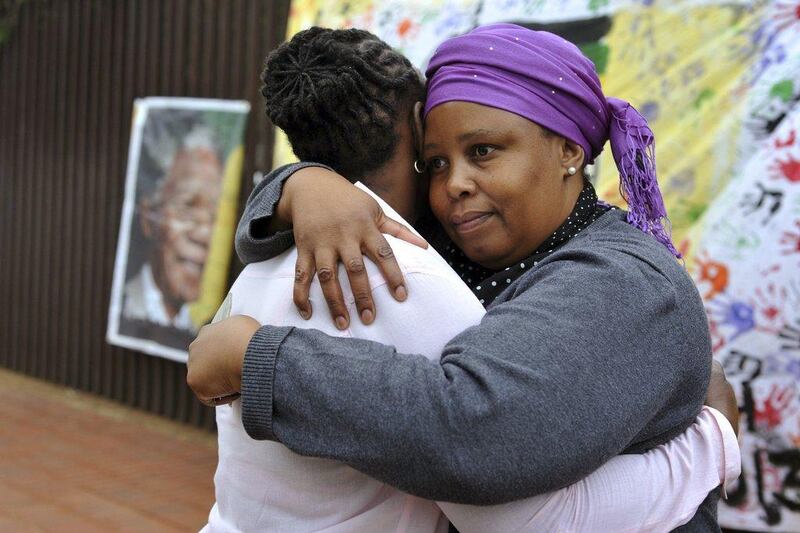In nearly seven decades spent fighting for freedom and equality, Nelson Mandela inspired and challenged the world to stand up for others.
As word of Mandela’s death spread, current and former world leaders from Abu Dhabi to Washington, London to Beijing, hailed Mandela’s indomitable courage in the face of adversity as an inspiration for all.
“The world has lost a true fighter and a formidable leader for peace, freedom and equality. He was a voice of justice, human dignity and goodwill for all of humanity,” said Sheikh Khalifa, the President of the UAE.
Sheikh Khalifa expressed his heartfelt sympathy to Mandela’s family and to the people of South Africa on their loss, describing Mandela as “a symbol of peace and an exceptional personality whose wisdom, tenacity, humility and qualities of leadership enabled him to overcome the bitterness of the apartheid era” in a message to South Africa’s president, Jacob Zuma.
Sheikh Khalifa recalled the strong relations Mandela had established with the late Sheikh Zayed bin Sultan Al Nahyan.
Sheikh Mohammed bin Rashid, the Vice President of the UAE and Ruler of Dubai, and Sheikh Mohammed bin Zayed, Crown Prince of Abu Dhabi and Deputy Supreme Commander of the Armed Forces, sent similar messages to Mr Zuma.
In a testament to his universal appeal, political leaders of various stripes joined critics and activists in paying tribute to Mandela as a heroic force for peace and reconciliation.
Some knew Mandela personally while many only knew him from afar, but they shared how they drew inspiration from his strength and looked to live his message of continuing the struggle against social injustice and for human rights.
“He no longer belongs to us. He belongs to the ages,” said Barack Obama, who shares with Mandela the distinction of being his nation’s first black president.
Flags flew at half-mast in numerous countries, including the United States, India, France and Britain and at the United Nations headquarters in New York.
Britain’s Queen Elizabeth II sent her personal condolences to Mandela’s family, saying she “remembers with great warmth” her meetings with a man who “worked tirelessly for the good of his country.”
The British prime minister, David Cameron, who in 2006 apologised for what he said were the “mistakes” of his Conservative Party in its response to apartheid in Britain’s former colony, said: “A great light has gone out in the world.”
Xi Jinping, the president of China, which supported apartheid’s opponents throughout the Cold War, praised Mandela’s victory in the anti-apartheid struggle and his contribution to “the cause of human progress”.
For Chinese rights activists, Mandela’s death served as a reminder that one of their own symbols of freedom, Nobel Peace prize laureate Liu Xiaobo, remained jailed by Chinese authorities.
“This moment magnifies how evil the current regime is,” Beijing activist Hu Jia said.
India’s prime minister, Manmohan Singh, compared Mandela to his country’s own icon for the struggle for freedom, the independence leader Mahatma Gandhi.
“A giant among men has passed away. This is as much India’s loss as South Africa’s. He was a true Gandhian. His life and work will remain a source of eternal inspiration for generations to come.”
India announced a period of mourning for five days. Flags will fly at half-staff and “there will be no official entertainment”, the government said.
The United Nation’s top human rights official, Navi Pillay – a South African who was once a defence lawyer for anti-apartheid activists – said Mandela “was perhaps the greatest moral leader of our time.”
Ms Pillay recalled how Mandela’s release from prison triggered a “thirst for revenge” among his supporters but that he emphasised forgiveness over vengeance.
“He told us to throw our spears and guns into the sea,” she said. “He showed us that a better future depended on reconciliation, not revenge.”
In Haiti, a Caribbean nation that became the world’s first black republic in 1804 through a successful slave revolt, Mandela symbolised the struggle for black equality.
“Mandela is not only the father of democracy in South Africa, but is also a symbol of democracy,” said Michel Martelly, the Haitian president. “And like any symbol, he is not dead. He is present in all of us and guides us by his lifestyle, his courage and faith in the true struggle for equality.”
“Mandela’s message will not disappear. It will continue to inspire those fighting for freedom and to give confidence to people defending just causes and universal rights,” said French President Francois Hollande, who is hosting dozens of African leaders this week for a summit on peace and security.
Myanmar pro-democracy leader and fellow Nobel Peace Prize laureate Aung San Suu Kyi paid tribute to Mandela as a “great human being who raised the standard of humanity.”
“I would like to express my extreme grief at the passing away of the man who stood for human rights and for equality in this world,” she said. “He also made us understand that we can change the world.”
At the Muhammad Ali Centre in the United States, on display is a photograph of the US boxing great with Mandela, their hands clenched into fists as if they’re boxing.
“He made us realise, we are our brother’s keeper and that our brothers come in all colours,” Ali said. “He was a man whose heart, soul and spirit could not be contained or restrained by racial and economic injustices, metal bars or the burden of hate and revenge.”
* Associated Press with additional reporting by Wam and Agence France-Presse





